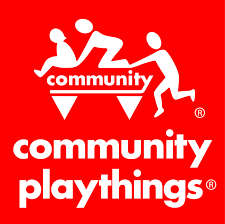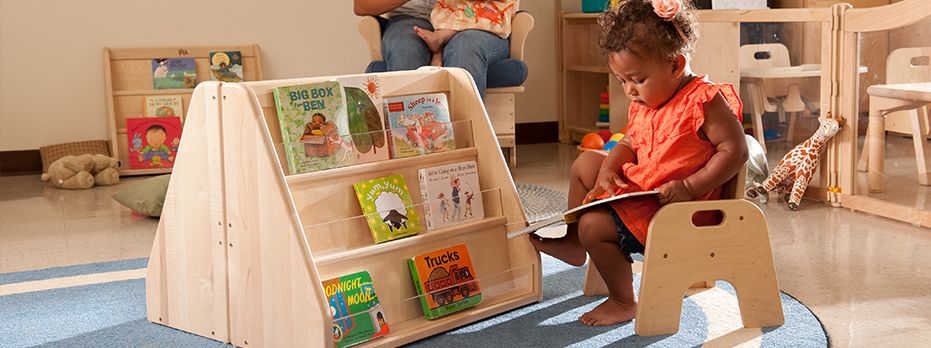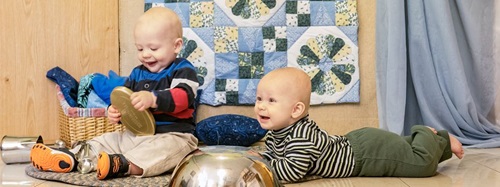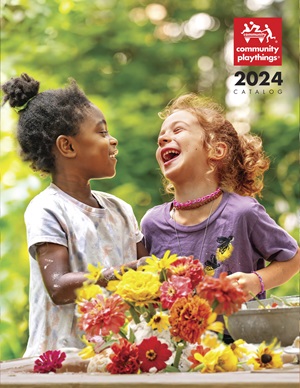Secrets for Early Childhood Professionals
| July 2005Recent research findings that infant/toddler child care is of questionable quality in many centers in the United States challenges directors and care providers (Howes, Whitebook, and Phillips, 1992). These findings sound a clarion alarm. Infant mental health specialists have clearly documented the crucial importance of the first years of life for the future emotional well-being of children. So how do child care directors and staff respond to these worrisome findings?
Whether providers work in a center based facility or in family day care, they need to know first and foremost the fundamental secrets of quality infant/toddler care. The essence of quality care for infants and toddlers depends on the intimacy a caregiver develops in relationship with the baby. Professionals work toward understanding and generously meeting infant needs.
Each caregiver needs to be willing to develop an “I-THOU” relationship with a baby, rather than to treat the baby as a non-verbal object who is pleasant enough and can be easily given a bottle or a diaper change from time to time. Babies thrive on body loving, with lots of cuddling and lap time. But just holding is not enough. Every baby needs a tuned-in adult partner committed to genuine engagement with the unique little person that each baby is. Quality infant/toddler caregivers fine-tune a special relationship with each baby.
Here are some important ideas for care providers:
Hold and Mold: Nourish Babies
Babies need nursing and warmth, safety and cleanliness. Beyond physical essentials, every baby needs someone to mold into, to drape upon, to lean against, to crawl into the lap of. Babies need to sink into somatic certainty on the caregiver’s generously accepting body. Nourish your babies emotionally!
Be a Responsive, Reciprocal Partner
Every baby needs a “tuned in partner” to dance with emotionally. The quality caregiver interprets signals of distress – crying, compulsive self-rocking, or vacant eyes – promptly and accurately. Tender personal comforting promotes baby’s positive attachment and primes cooperativeness and kindness with others.
Enhance Your Noticing Skills
Keen observational skills clue in the caregiver to infant needs. Some babies want to cuddle more; some want to explore more. Some want to dash away bravely and return for home-base security bouts of rest and reassurance.
Learn Ages and Stages: Prerequisites and Windows
Learn norms and milestones well, so that you can lure babies further in development. Provide supports when early learning is more difficult, and recognize delays. For example, some developmental timetable windows are wide (walking). Some are narrow (pincer prehension).
Prerequisites are important for the dialectical dance of early learning. No “dance” comes without a few backward steps! Toilet learning often means a few days dry, a few days with accidents. Toilet learning depends on many prior accomplishments like learning the words “pee” and “poop” and being able to sit still for some time rather than busily being on the move almost every waking moment, as so many toddlers are.
Digest and Apply Developmental Theories
Eriksonian theory, Piagetian theory, and Mahlerian theory teach us that there is always a balance – a see-sawing between striving toward growth and optimal accomplishments, on the one hand, and the negative dark pole – of anger and frustration, of no-saying, of pushing away, of falling apart from efforts to push forward in development. A toddler who is wildly no-saying and defiant still needs you to be there as a refueling station, a place of refuge when her still-baby soul is on overload, and coping with growing up is too much for her.
Learn Jean Piaget’s sensorimotor milestones in infancy:
- Object permanence
- New schemas
- Means-ends separation
- Spatial understandings and solutions for detour problems
- Causality learning and searching for causal
- Mechanisms to work toys
- Eye-hand coordinations
- Gestural and language imitations of the new and unfamiliar, the seen and unseen
Quality caregivers apply Piaget’s principle that children learn at the cutting edge between what they already know and is easy for them, and the new that a teacher will help them to struggle to learn. Hone your matchmaking skills at the boundary so that you adapt what new learning you are luring baby into, and what learning that baby has already begun to master. Offer activities, toys, and opportunities for learning that are appealing for each individual child. Encourage babies to stretch their persistence in trying.
Provide Language Treasures: Enhance Beauty in Children’s Lives
Language playfulness, rhyming, chanting, singing, delighted responsiveness to infant vocalizations – all promote the emergence of early language.
Babies respond to and enjoy beauty. Put on leisurely waltzes and whirl babes around in arms as you hum and sing with them. Give toddlers large nylon colorful squares and let them sway and twirl and dance to gentle music. Put up colorful pictures of beautiful scenes or animals on the lower walls of the child care room.
Read Picture Books
Talk about pictures in books as you snuggle babies close to your body. Chose books with single pictures of familiar and cherished subjects, such as puppies, babies, bath time, family outings, favorite foods, digging in sand, ball play, swinging, or settling down for a nap.
Promote Kindness and Friendliness
Toddlers will need a teacher boost to encourage rich sociodramatic play and positive peer interactions. Try a wide variety of positive discipline techniques. Emphasize words for sharing, caring, and taking turns. Toddlers will play out with their dolls the same nurturing interactions you are modeling with them. So be sure to provide a variety of props, such as dolls of different ethnicity and lots of baby blankets and toy bottles.
Discover Infants’ Unique Temperamental Styles
Each baby has unique temperamental characteristics. Some are slow to warm up to strangers or new foods or changes in curricular offering. They adapt cautiously to change. Some enthusiastically rush toward novelty. Some are upbeat in mood while others are more quiet, with low-key moods. Some babies are irritable and sensitive, whether to nose wiping or too-quick handling or a hungry tummy, or too much pressure for toilet learning or neat eating. Some babies manage a higher tolerance for hunger pangs; some toddlers have more patience in waiting for a turn with a toy. Some toddlers fall apart into violent tantrums when disappointed or thwarted even mildly. Self-control must be supported by firm, loving caregiving.
You can predict sleep and feeding and voiding patterns with some babies. Other are quite irregular, with no predictable schedule. Some infants and toddlers respond without fuss to routine care in diapering or wiping up. Others have intense reactions to caregiving interactions --- sometimes negative, sometimes joyous. Every baby comes with a biologically based assortment of temperamental traits. The perceptive caregiver notices each baby’s temperament traits and how they cluster. Thus, caregivers can individualize care in tune with each infant or toddler’s personality.
Conclusions
Wise directors will look for special persons to care for the youngest ones. A tryout time may be necessary when hiring caregivers. Does the trainee lure babies into activities just a wee bit difficult, puzzling, different, more complex? Does the new caregiver notice when tasks are difficult, and dance down developmental ladders, and scaffold tasks for babies so that a frustrating activity becomes easier or more comprehensible? Such “dancing” gives babies courage to try.
Quality infant/toddler care giving is a highly skilled profession. With powerful insights and knowledge, plus priceless personal gifts for intimacy and cherishing, caregivers enhance the daily lives of very young children. Keep faith in yourself and your intellectual spunk and sparkle for carrying out a noble job: high-quality infant/toddler care giving.






